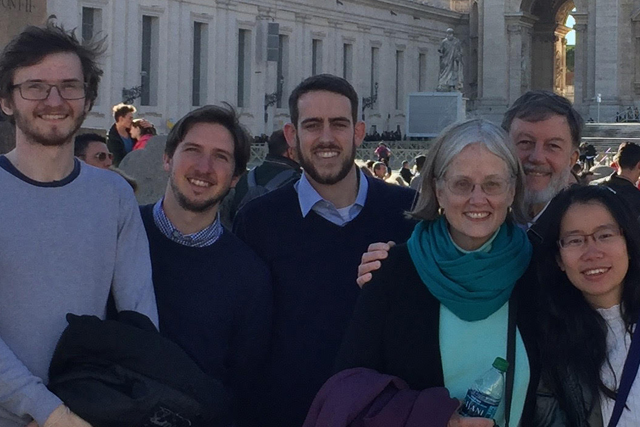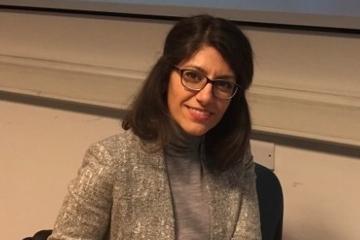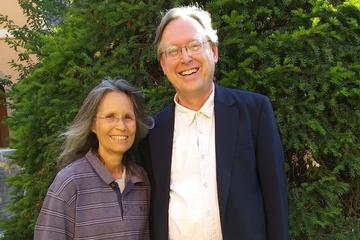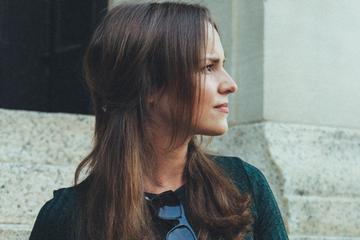
By Elena Dini
ROME — During the spring semester, two professors from Princeton Theological Seminary, George and Deborah Hunsinger, lived at The Lay Centre with the residential community. George is the McCord Professor of Systematic Theology, and his wife, Deborah, is the Charlotte W. Newcombe Professor of Pastoral Theology at the same school.
George received the 2019 Atelier Ecumenico Fellowship from the Pontifical Gregorian University in order to teach a course on the Eucharist and Ecumenism, with a special focus on the Eucharist in the Reformed tradition.
We took the opportunity to ask them a few questions about their academic careers and about the joys and challenges of their common work as a married couple.
George and Deborah, you are both scholars and ordained Presbyterian ministers. It is evident that you share a lot in your life together as well as benefit from looking at faith and academia from different and complementary perspectives. What has been your experience as a couple?
We have been married for 42 years. We met at Yale Divinity School when we were students. Over the years, we have had some challenges as we seek to balance our different career paths along with parenting, ministry and scholarship. We were so grateful when we both received full-time faculty appointments at Princeton Seminary in 2001. We were the first married couple to serve as tenured faculty members at the school.
When we were at Yale, we both took a course on the theology of Karl Barth that has been important to us in different ways. One of us (George) has had more dogmatic interests, while the other (Deborah) has sought to bring Barth into conversation with pastoral theology. I (George) have also developed a Barthian approach to issues of social justice in our contemporary political context, while Deborah has developed his thought for her work as a pastoral counselor. Karl Barth has been a theological reference point for us while we have moved in different directions, all the while seeking to centre our work in Christ.
We came to see how much Barth had become a household name when our daughter Rachel drew a picture of our family. She was three years old. “There’s Mommy, and my sister, Amy; there are Daddy and me, and my best friend, Becky Fellows,” she explained. There was one more figure over in the corner of the drawing. When we asked her, “Who is that person?” she replied: “That’s Karl Barth!”
You spent almost three months in Rome living at The Lay Centre. What was the added value for you of living in a place with such a diverse community of young people?
This was a tremendous gift for us. It was an enrichment to be part of such an active, interesting fellowship. Had we stayed in some other residence during our time in Rome, we would not have had a community. We loved the opportunity to pray together in the evenings and to have ongoing conversations at the table. We found the students to be vitally engaged not only with theology but also with many contemporary issues. Their faith in Christ is inspiring, and they are serious about finding a path in which they can serve him. While we are used to teaching students from many church backgrounds, we have seldom had so many opportunities to engage in dialogue with Catholics, as well as with Eastern Orthodox students and a Muslim woman, as well as and the many who are interested in dialogue with Islam. We are encouraged to meet such fine young people. We feel that it is a good sign for the future of the Catholic Church. We also have enjoyed some of the many events organized here, not only hearing the guest speakers but also crossing paths with people whom we would have otherwise never met.
George, you came to Rome as a visiting professor at the Gregorian to teach a course on “The Eucharist and Ecumenism.” Could you mention a couple of key points that illustrate how you approach this topic?
My general aim is to change contradictions into contrasts among the traditions and to widen the circle of acceptable diversity. People within a tradition do not always recognize how wide is the range of opinion within it. For example, my students are not always aware of how fierce the debates were between Jesuits and Dominicans in the 16thcentury on the relationship between grace and freedom. We have had similar debates among the Protestant traditions. If we can live with diversity within our own tradition, maybe we can get to the point where we narrow the range of disagreement among traditions. We need to reach the point where our different views of the Eucharist are no longer church-dividing. It is a scandal that the table of unity has become the flashpoint of division. My teacher George Lindbeck said that the Eucharist tastes bitter in a divided church.
I have tried to share with my students how important it is to work for a future united Church across our divisions. I try to address the key theological issues in my book, “The Eucharist and Ecumenism” (Cambridge, 2008).
Deborah, you have approached academic research on faith from another perspective: that of pastoral counseling. How would you describe the relationship between theology and psychology?
My first book is called “Theology and Pastoral Counseling: A New Interdisciplinary Approach”(Eerdmans, 1995). As a trained pastoral counselor, I found myself asking, “How can we relate specifically theological claims to those of psychology?” Many scholars argue for “integration” between the two. Instead, I argue that each field has its own integrity, which should not be confused with the other. “Integration” takes place within the practitioner, but not at the theoretical level.
I adopt the logic of what I call “the Chalcedonian pattern.” I argue that psychology and theology are best related to one another “without separation or division,” and “without confusion or change,” but with a normative priority and precedence being granted to theological concerns. Psychology should be understood within a larger theological context of meaning, rather than the reverse. Each discipline has its own integrity within its proper sphere, and each makes a particular contribution to what is being interpreted, but they cannot be translated into each other’s conceptualities without distorting them.


